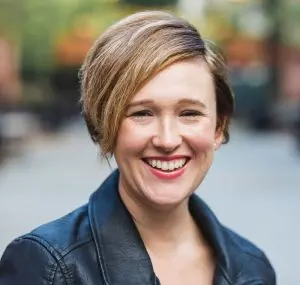A punk rocker contemplating joining the rabbinate. A dildo-wielding sex educator who is also a practicing Muslim. A New York Times employee who fought the media company’s “good enough” parental leave policy.
These are some of the unique moms interviewed for the podcast The Double Shift. Launched this year, the 10-part series documents the wide range of working motherhood in America. It’s not about parenting or raising children (don’t expect baby nursing tips or healthy food recipe tricks); it’s about mothers themselves as they balance professional and personal development, painting a nuanced portrait you might not otherwise have encountered. They’re inspirational, complex, and vulnerable but with a dash of edge.
“They all challenge the status quo in some way,” says podcast founder and host Katherine Goldstein. “We’re committed to telling stories with diverse perspectives, and a really big part of it is being able to talk to people about their identities and experiences beyond clichés—and beyond parenthood.”

Another episode takes listeners inside the legal brothels of Nevada, where workers’ experiences largely echo that of any other working mom. Goldstein was determined to give these women the opportunity to personally discuss their careers, noting it’s a group who people want to talk about and not a lot of people talk to. “The idea of a sex worker mom is sort of an outlandish idea to people—many don’t even know that they exist,” says Goldstein, “and so I was really curious about what their experiences were in a profession that is highly stigmatized.”
Episode three, “The Candidate Who Carpools,” gives an intimate portrait of first-time Democratic candidate Ashton Clemmons, 35, as she runs for the North Carolina General Assembly. The former public school administrator and mom of three was one of many women recruited to throw their hat in the political ring in the wake of the 2016 election.
Two weeks before the election, The Double Shift trails Clemmons as she zips between campaign events, all while divulging her hopes, fears, and often mixed emotions. She’s determined to make progress in her state, but passion doesn’t always outweigh personal, nagging doubts.
“Running for office is very publicly vulnerable in a way I don’t like to be,” admits Clemmons. “To put yourself out there where you know how critical people are of politicians but the vast majority of people you’re spending time with—they’re making a decision about you in about five seconds, right? . . . I worked really hard to get to a high-level position in my career pretty quickly, and I’ve let that go to do this, which feels risky.”
At one point amidst campaign chaos, Clemmons commits an all too common parenting mistake: she realizes she forgot to pick up her daughter from ballet. The guilt—and tension—is palpable. “Here ya’ go, mom failing!” Clemmons awkwardly laughs. “It’s part of [the process], but it’s not good.”
Goldstein stresses that such insight only comes with spending days on the road, interviewing and observing subjects at length: “You don’t get that kind of reporting when you just have them on the phone for half an hour.”
New voices
The Double Shift stems from Goldstein’s own personal experience navigating modern motherhood. The New York City journalist admittedly had “a really hard-charging, Lean-In-inspired career” in her 20s before deciding to have a child in her early 30s. Her son, however, was born with serious health complications. Then just six months after his birth, Goldstein lost her job.
The combination forced the new mom to challenge her identity, her work, and how she perceived success. “I really felt like a failure,” reflects Goldstein.
In time, she turned her focus to other working moms who, like her, struggled to meld their priorities. They harbored the same insecurities, and yet, save for a few personal essays each season, she didn’t see any media outlet seriously covering the topic from a journalistic lens.
“I realized how little research, reporting, and compelling storytelling was about being a working mother,” says Goldstein. More often than not, those who did write came from a predominantly white, privileged, and city-dwelling background. She wanted to change the narrative to one that contemplated the complicated nature of modern motherhood with a diversity of class, ethnicity, and employment.
Basically, she’s not interviewing anyone with a hot Silicon Valley startup—or who has a publicist.
“I think for a very long time, there weren’t a lot of mothers in positions of power in media to really tell different kinds of stories,” she says.
It wasn’t an easy sell. Podcast companies continuously rejected Goldstein’s pitch, instead expressing their interest in lifestyle content aimed at moms or celebrity-focused parenting chat shows. One podcast producer straight out told her he didn’t think “there was enough that was interesting about being a working mother” to sustain an entire series.
Today, The Double Shift is independently produced and part of the Critical Frequency Podcast Network, a women-owned company centered on elevating underrepresented voices in podcasting. It’s also funded in part through foundation grants, advertising, and a listener membership program.
Season one, which finished airing in June, featured a common theme throughout the interviews: mommy-shaming. Goldstein had anticipated it would be stress (“women being overwhelmed” is a common media stereotype, she notes). In fact, most subjects bemoaned how “people judge them.”
Season two will further analyze the emotional and professional aspects of working motherhood, in addition to the topic of gender dynamics in the home. Goldstein finds that especially poignant to millennials, who are increasingly putting their own stamp on the experience. All in all, she sees a generational shift in which women reject the status quo.
“There’s a lot of movement around changing workplaces, changing public policy, and refusing to say, ‘this is really hard, and I’m just going to be quiet about it,'” says Goldstein. “I see a lot of energy. A lot of people are not accepting what’s handed to them.”
More than anything, she’s hopeful about progress. By reflecting stories of change, The Double Shift endeavors to inspire more moms to fight for equality—both inside and outside the office. She sees the series as just the start of a much larger conversation and consciousness-raising social movement.
“We talked to a madam at the Mustang Ranch [brothel] about how you can support working moms,” says Goldstein. “My takeaway from that is: If a madam in a brothel can be thinking thoughtfully about supporting working moms, why can’t other workplaces?”
Season 2 of The Double Shift is slated for early fall.
Recognize your brand’s excellence by applying to this year’s Brands That Matter Awards before the early-rate deadline, May 3.
